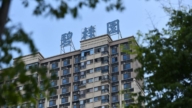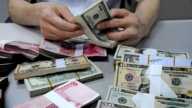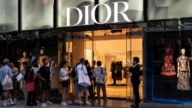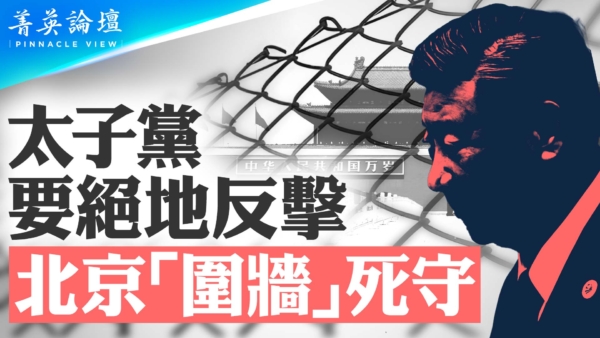【新唐人2014年03月18日訊】從17號開始,人民幣兌美元匯率的浮動區間,由1%擴大到2%。中共當局宣稱,這個政策是為了讓人民幣滙率邁向市場化,但有分析指出,中共是迫於國際壓力,才不得不放鬆管控,也有專家質疑,中共此舉背後有其他的動機。
自今年2月中旬以來,人民幣兌美元匯率出現多次暴跌,而後出現短暫反彈的震盪下跌趨勢。今年初至今,人民幣兌美元貶值已達1.6%。
3月15號,中國人民銀行宣佈,從17號起,銀行間即期外匯市場人民幣兌美元交易價浮動幅度由1%擴大至2%。公告聲稱,這是「為順應市場發展的要求,加大市場決定匯率的力度,建立以市場供求為基礎、有管理的浮動匯率制度。」
據了解,中共上一次鬆綁人民幣匯率波幅是在2012年4月16號,當時將匯率雙向波幅由0.5%放寬到1%。
美國南卡羅來納大學經濟學教授謝田:「它控制受到很多批評,貿易夥伴都要求中國放鬆這種控制,不要施加人為的操縱。中共受到壓力,它就開始放寬,允許在一個小的區間裡浮動,但是還是在控制。原來它不讓你任意真正的浮動,而現在你在一個小的區間裡浮動,原來是很小的區間,現在把區間稍微放寬一點,那還是控制。」
旅美中國社會問題研究人士張健:「中國銀行這一次把外匯放寬到百分之二,這當然足以證明,中國目前的錢荒的確是出現了很多問題。搞這個事情一方面可能能解燃眉之急,但是這個政策還是飲鴆止渴,因為中國的經濟走入死胡同以後,完全靠頭疼醫頭的模式是不能解決問題的。」
有報導說,中共當局是因為擔心國際熱錢大規模流入或者流出中國市場,會影響宏觀經濟,因此一直控制著人民幣兌美元的匯率。
對此,美國南卡羅來納大學經濟學教授謝田透露,所謂的熱錢主要是來自外逃的資金。
謝田:「中共內部完全可以內線操作、內線交易,中共既得利益集團它一買一賣,就可以賺大錢。控制匯率就有可能鼓勵熱錢流進來或流出去,就是利用利差來賺錢。中國的熱錢,是中共貪官自己的錢,它已經逃出國外了,現在以海外資本名義去中國套利。」
大陸財經評論人士「牛刀」,日前發表一篇文章指出,今年1月份數據出來,人民幣存款流失9402億元,那很容易的解釋就是房價見頂,投資人賣掉房子,接盤的人取出存款買房,這種現象是爆發金融危機的前兆,因為最後的接盤人就是為泡沫最後的買單人。而人民幣的隨後大跌,是因為這麼巨額的資金不再存入銀行,而是換成美元流出中國。
據《路透社》報導,中共當局決定擴大人民幣即期匯率浮動幅度,引發了國外企業和投資者對人民幣及中國經濟的擔憂。報導說,儘管這是2005年中國匯改以來,人民幣對美元匯率波幅第三次擴大。但與以往不同的是,國外投資者不敢再像前兩次那樣,一如既往的單邊押注人民幣升值,市場比以往更加擔心中國經濟下行壓力究竟有多大,尤其2月出口暴跌18%,製造業採購經理指數滑落至8個月以來最低點,反映出中國經濟進一步放緩。
報導說,投資者也猜測中共擴大人民幣兌美元匯率的浮動區間,背後是否有其他動機。紐約「梅隆銀行」的市場策略師Michael Woolfolk對今年人民幣貶值感到震驚,他向《路透社》表示,懷疑當前中國顯露出的趨勢逆轉,是否是中共當局精心策劃的結果。
丹斯克銀行(Danske Bank )新興市場首席分析師Lars Christensen,他也質疑中共此舉的行動時機,他想知道中共真正的擔憂是不是經濟增速的下滑。
報導指出,如果資金外流的程度超過了預期,那麼中共這樣行動的被迫程度究竟有多大。這是一個防禦性舉措?還是一個開啟貨幣寬鬆大門的先發制人的舉動呢?
採訪/朱智善 編輯/陳潔 後製/孫寧
Questions Behind The Motivation of Greater RMB Volatility
Starting on March 17, China’s central bank doubled the yuan’s
trading band to 2%, claiming to enhance the currency’s market value.
The CCP regime is believed to have loosed its grip on
the tightly controlled currency due to international pressure.
Many experts question the motivation behind the move.
Since mid-February this year, the RMB to the U.S. dollar
exchange rate has taken several nose-dives.
As of today, the RMB to Dollar ratio has depreciated 1.6%.
On March 15, the People’s Bank of China announced:
“Effective from 17 March 2014 onwards, the floating band of
RMB against US dollar on the inter-bank spot foreign exchange
market is enlarged from 1 percent to 2 percent."
The announcement claimed it is “to meet the demand of market
development, give market a bigger role in exchange rate pricing,
and build a managed floating exchange rate regime based on
market supply and demand."
The last time the CCP relaxed the RMB exchange rate
was on April 16, 2012, when it was taken from 0.5% to 1%.
Xie Tian, business professor at University of South
Carolina Aiken: “There has been many criticisms,
and the trading partners have all requested CCP
to release its control and not to impose artificial manipulation.
The CCP started to release in a small floating range under
pressure, but the control continues.
It didn’t allow you to float freely; now they give a little
bit of floating range but everything is still controlled."
Zhang Jian, Chinese social issue researcher: “It’s certainly to
prove that CCP has money shortage problem based on the
relaxation of foreign exchange to 2%.
It might temporarily solve a pressing need, but this policy is
just to quench a thirst. China’s economy reached a dead end.
This type of policy does not resolve the problem."
Some reports say that the CCP controlled the RMB-Dollar
exchange rate for fear of large international hot money inflows
or outflows which might affect the Macro-economy.
University of South Carolina business professor Xie Tian
says the so-called hot money is mainly from the capital flight.
Xie Tian: “The CCP can operate and trade from inside.
As the interest group, the CCP makes huge profits through buying
and selling.
Such exchange rate control is likely to encourage the hot money
to flow in or out and the CCP gets to make money on the
money difference.
The Chinese hot money has become the overseas assets
of corrupt officials.
They now return to China as overseas capital to invest in China
and gain profits."
Financal commentator Niu Dao recently published an article
saying that based on data of this January,
the RMB deposit has lost 940.2 billion yuan ($152 billion).
This explains why when housing prices peaked; investors
sold their houses and purchasers took out money for a house.
It is a forewarning of the financial crisis because the final
purchaser will pay the bill for the bubble.
The subsequent RMB crash is caused by such large amount of
money not returning to the bank but going out of China.
Reuters reports that the Chinese central bank’s decision to
relax its grip on the yuan is aggravating concerns
among foreign executives and investors in China.
The doubling of the trading band could point to much greater
downside risk in a currency that many investors have treated as
a one-way appreciation bet for years, even when the yuan’s daily
trading range was expanded in the past.
Reuters added that these investors are cautious of signs of
slowing economic growth, highlighted by a dramatic 18 percent
fall in exports in February and sluggish manufacturing.
Global markets strategist Michael Woolfolk from BNY Mellon
told Reuters, “We have all been surprised at
the sell-off of the yuan versus the dollar."
He says they are “wondering if the beginning of a trend reversal
is being orchestrated by the government …"
Lars Christensen, chief emerging market analyst at Danske Bank
in Copenhagen, also questioned the timing of the move and
wondered if the slowdown in economic growth is the real
concern for authorities.
Reuters reports, The big question is… to what extent they are
being forced to do it, if outflows have been more than were thought.
So is it a defensive move or a pre-emptive move
that opens the door for monetary easing?
Interview/Zhu Zhishan Edit/Chen Jie Post-Production/Sun Ning




























